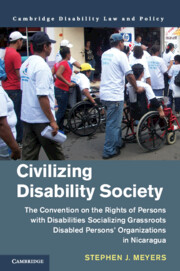 Civilizing Disability Society
Civilizing Disability Society Published online by Cambridge University Press: 27 September 2019
The identity as a person with disabilities is a prerequisite for claiming disability rights. In Nicaragua, however, the disability identity is particularly nuanced for persons wounded in the Sandinista Revolution or the subsequent civil war. The members of the Organization of Disabled Revolutionaries (ORD) are all ex-Sandinista soldiers who are proud of their service. For them, their disability symbolizes their sacrifice as protectors of the community in the name of solidaridad. They adamantly identify as “war wounded” rather than as “persons with disabilities.” As a result, they increasingly see the disability-rights movement as a threat to their war-hero status. The members of the Nicaraguan Association of the Disabled Resistance (ADRN), however, see disability rights and the disability identity as an important opportunity. As wounded ex-combatants who fought, and lost, on the opposing side of the civil war, they are stigmatized within Segovia for having fought as Contras. Their disabilities acquired from war remind community members of their past as “traitors,” and thus not deserving of rights. But, by using disability rights as a new identity frame, the ADRN is able to gain access to opportunities that in the past had been denied.
To save this book to your Kindle, first ensure [email protected] is added to your Approved Personal Document E-mail List under your Personal Document Settings on the Manage Your Content and Devices page of your Amazon account. Then enter the ‘name’ part of your Kindle email address below. Find out more about saving to your Kindle.
Note you can select to save to either the @free.kindle.com or @kindle.com variations. ‘@free.kindle.com’ emails are free but can only be saved to your device when it is connected to wi-fi. ‘@kindle.com’ emails can be delivered even when you are not connected to wi-fi, but note that service fees apply.
Find out more about the Kindle Personal Document Service.
To save content items to your account, please confirm that you agree to abide by our usage policies. If this is the first time you use this feature, you will be asked to authorise Cambridge Core to connect with your account. Find out more about saving content to Dropbox.
To save content items to your account, please confirm that you agree to abide by our usage policies. If this is the first time you use this feature, you will be asked to authorise Cambridge Core to connect with your account. Find out more about saving content to Google Drive.